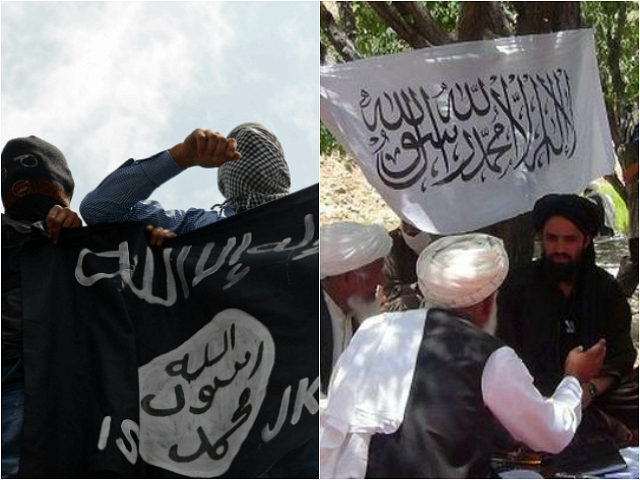The Islamic State (ISIS/ISIL) and the Taliban, an al-Qaeda ally, stand accused again of joining forces to carry out a deadly terrorist attack in Afghanistan that left up to 50 mostly Shiite civilians dead and hundreds of others in captivity last week.
Agence France-Presse (AFP) notes that the incident highlights “rare cooperation” between the two groups, which have been engaged in various turf battles since ISIS established a presence in the Afghanistan-Pakistan region back in January 2015.
Radio Free Europe/Radio Liberty (RFE/RL) reports:
Taliban and IS [Islamic State] fighters working together in a rare joint operation killed around 50 men, women, and children in the mainly Shi’ite village on August 5 after overrunning a government-backed militia in a two-day battle, according to local officials, who also said they took about 150 families captive.
The Taliban denies it was a joint operation, saying a group under one of its commanders carried out the attack.
Nevertheless, RFE/RL learned that local villagers reported seeing jihadists flaunting the white banner of the Taliban and the black banner of ISIS during the attack, which took place in a remote village in northern Afghanistan’s Sar-e Pul Province.
The Pentagon believes many of the ISIS fighters in Afghanistan are believed to be defectors from the Islamic Movement of Uzbekistan (IMU), which has fought alongside al-Qaeda and the Taliban against U.S.-led troops. Uzbekistan is located north of Afghanistan, close to Sar-e Pul Province where the joint ISIS-Taliban attack took place.
Zabihullah Amani, a spokesman for the provincial governor, told AFP that the local Taliban commander has pledged allegiance to ISIS.
ISIS jihadists have engaged in battle with their Taliban counterparts in the past, competing for territory, influence, and fighters in Afghanistan.
“Taliban and IS fighters have regularly clashed in Afghanistan over the past two years, but security sources say they have teamed up in the past to strike Afghan forces in certain areas,” reports RFE/RL.
AFP learned from an unnamed Afghan security source that, although the terrorists released 235 captives, there are still an estimated 100 people being held hostage by the Taliban and ISIS jihadists.
“This evening, 235 people, including women and children, were released from Mirza Olang as a result of mediation by the local elders and provincial officials,” Zabihullah Amani, a spokesman for the provincial governor, told AFP.
U.S. and Afghan officials have repeatedly alleged that ISIS and the Taliban have collaborated on terrorist attacks, a claim that both groups have denied.
“It is completely wrong, it is propaganda of our enemy, ISIS is our enemy, there is no ISIS in Sar-e-Pul. Our commander in Sar-e-Pul is called Ghazanfar, who is not an ISIS,” Zabiullah Mojahid, a Taliban spokesman, told CNN.
Nevertheless, the Independent cites local officials as indicating the two groups decapitated many of the people recently killed in the northern Afghan province.
Echoing the U.S. military, Hanif Atmar, Afghan President Ashraf Ghani’s national security adviser, told the Times of India (TOI), in March, “This idea that Taliban and Daesh are opposed to each other is wrong.”
In December 2016, Gen. John Nicholson, the top commander of U.S. and NATO forces in Afghanistan, told reporters that Russia’s allegation that “the Taliban are the ones fighting Islamic State … is not based on fact.”
Gen. Nicholson acknowledged that ISIS and the Taliban reached a truce in eastern Afghanistan.
The commander has conceded that the majority of ISIS terrorists in Afghanistan were at some point members of the Pakistani Taliban, officially known as Tehrik-e Taliban Pakistan (TTP).
Although the two groups are affiliated, the Afghan and Pakistani Taliban consider themselves two distinct groups, which operate under different leaders.
Still, both organizations are linked to al-Qaeda, which is considered an ISIS rival.
ISIS, the Taliban, and al-Qaeda are all Sunni groups. Late last year, Nicholson revealed, ISIS’s Afghan branch “is formed of members of the Tehrik-e Taliban Pakistan, the Islamic Movement of Uzbekistan, and even some former members of the Afghan Taliban.”

COMMENTS
Please let us know if you're having issues with commenting.